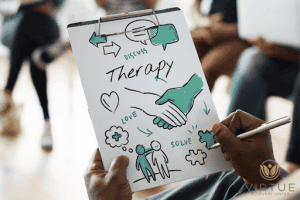Key Takeaways
- Addiction therapy helps you understand and heal the emotional and psychological roots of substance use, not just the symptoms.
- It can be especially helpful if you’ve relapsed, feel emotionally overwhelmed, or rely on substances to cope.
- Real recovery often includes medical detox, group therapy, and relapse prevention, all working together.
- Therapy builds tools for long-term sobriety by addressing both the physical and mental aspects of addiction.
- Seeking therapy is a sign of strength, not failure.
Introduction
If you’re here wondering whether addiction therapy might help, you’re not alone, and you’re not broken. Maybe you’ve tried to quit before, or you’ve made it through detox only to find yourself struggling emotionally. The truth is, addiction doesn’t end when the substance is gone. It lingers in our thoughts, our routines, and our emotions. That’s where therapy comes in. It’s not just about stopping, it’s about understanding what led you to use in the first place and learning how to move forward with confidence and clarity.What Is Addiction Therapy?
 Addiction therapy is personal. It’s not one-size-fits-all. It’s a process that helps you make sense of the pain, patterns, and triggers behind your substance use. At Virtue Recovery Houston, this means combining approaches like:
Addiction therapy is personal. It’s not one-size-fits-all. It’s a process that helps you make sense of the pain, patterns, and triggers behind your substance use. At Virtue Recovery Houston, this means combining approaches like:
- Medical detox, to help your body safely reset
- One-on-one counseling to work through your emotions and trauma
- Group therapy, so you know you’re not alone in what you’re feeling.
- Relapse prevention, to build real-world skills and stay on track
When Should You Consider Therapy for Addiction?

You’ve Tried to Quit, But It Doesn’t Stick
Whether it’s your first attempt or your fifth, relapsing doesn’t mean you’ve failed. It often means you need more support from the best alcohol rehab near you, especially around your thoughts, stress, and triggers. Addiction therapy gives you a safe place to understand why you’re struggling and teaches you tools to help you stay steady.You Use Substances to Cope with Life
Maybe you drink or use drugs when you’re stressed, anxious, lonely, or overwhelmed. You’re not weak for doing what helped you survive. But therapy can offer you better, healthier ways to manage emotions, without depending on substances.You Feel Alone in the Battle
Addiction thrives in isolation. Therapy, especially group therapy, helps you connect with others who get it. Sharing the journey with people who understand can be one of the most healing experiences. Explore group therapy at Virtue Recovery Houston, where connection is an integral part of the healing process.You’re Struggling with Mental Health
Depression, anxiety, and PTSD often walk hand in hand with addiction. Addressing them together in therapy is crucial. Because until you heal what’s underneath, the urge to escape will keep showing up.What You’ll Experience in Addiction Therapy?
 The experience isn’t about judgment; it’s about healing. Here’s what you might expect:
The experience isn’t about judgment; it’s about healing. Here’s what you might expect:
- A safe space to talk about what’s going on
- Custom plans built around your needs, not someone else’s
- Tools for managing cravings, avoiding relapse, and regulating your emotions
- Support from therapists who understand both addiction and mental health
Is Recovery Only Physical?
So many people believe that once you detox, you’re done. But addiction isn’t just in your body, it’s in your mind, too. This short video, “Is your addiction physical… or all in your head?”, dives deep into the mental side of addiction. It’s powerful because it reminds us that healing our minds is just as essential as healing our bodies.Why is Therapy a Long-Lasting Solution?
Effective therapy doesn’t just focus on the present; it helps prepare you for the future. At Virtue Recovery Houston, we use relapse prevention therapy to help you understand what triggers your cravings and teach you how to respond differently. Discover the importance of relapse prevention and how it can enhance your journey forward. You’ll also rebuild your self-esteem, relationships, and purpose, step by step.What Science Says About Therapy?
 Research from top institutions like the National Institute on Drug Abuse, Harvard Health, Johns Hopkins, and the CDC confirms what many already know firsthand: therapy improves recovery success rates.
The National Institute on Drug Abuse also emphasizes the importance of therapy in helping people not only stop using substances but also rebuild meaningful, connected lives.
Research from top institutions like the National Institute on Drug Abuse, Harvard Health, Johns Hopkins, and the CDC confirms what many already know firsthand: therapy improves recovery success rates.
The National Institute on Drug Abuse also emphasizes the importance of therapy in helping people not only stop using substances but also rebuild meaningful, connected lives.
Conclusion
If you’re asking yourself whether addiction therapy is right for you, the answer might already be yes. Therapy isn’t a last resort; it’s a first step toward something better. Whether you’re struggling after detox, feeling emotionally overwhelmed, or just ready to stop the cycle for good, therapy gives you tools, space, and support. Call Virtue Recovery Houston today at 866‑806‑1065 to speak with someone who truly cares. Whether you’re ready to begin or just want to talk, we’re here to help you decide what’s next.FAQs
What is addiction therapy?
Addiction therapy is a personalized approach that treats both the physical and mental sides of substance use. It may involve individual therapy, group support, and relapse prevention.Do I need therapy if I’ve already detoxed?
Yes. Detox addresses the body, but therapy addresses the emotions, triggers, and habits that lead to relapse.How long does therapy last?
It depends on your needs, but many programs run for 30 to 90 days or more. Recovery is an ongoing process, and therapy helps you stay supported.Will my insurance cover it?
Many insurance plans do cover addiction therapy. You can contact Virtue Recovery Houston to help you verify your benefits.How Can Understanding the Reasons to Get Sober Help Determine if Addiction Therapy is Right for You?
Understanding the reasons to get sober can be a transformative step in your recovery journey. When you acknowledge the impact of addiction on your life, you can better assess your needs. This clarity allows you to discover the benefits of sobriety, making it easier to determine if addiction therapy is right for you.
Resources & Citations
- National Institute on Drug Abuse. Drugs, Brains, and Behavior: The Science of Addiction – Treatment and Recovery. National Institutes of Health, Sept. 2020, https://nida.nih.gov/publications/drugs-brains-behavior-science-addiction/treatment-recovery.
- Centers for Disease Control and Prevention. Overdose Prevention: Treatment. 27 Mar. 2024, https://www.cdc.gov/overdose-prevention/treatment/index.html.
- Volkow, Nora D. “Making Addiction Treatment More Realistic and Pragmatic: ‘Perfect’ Should Not Be the Enemy of ‘Good.’” National Institute on Drug Abuse, 31 Jan. 2022, https://nida.nih.gov/about-nida/noras-blog/2022/01/making-addiction-treatment-more-realistic-pragmatic-perfect-should-not-be-enemy-good.







